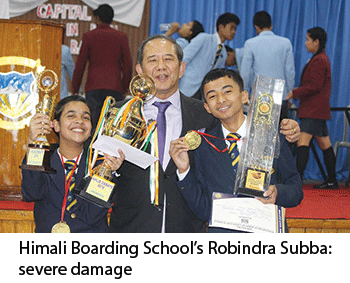 The desperate moves that politicians across the country — witness the U-turn of Janata Dal (U) supremo Nitish Kumar in Bihar — make to acquire and retain power, especially in India’s 29 states and seven Union Territories, hit children the hardest. With the BJP, which rules at the Centre, reportedly winning friends and influencing people in West Bengal (pop.91 million) ahead of the legislative assembly election scheduled for 2021, the state’s chief minister and head of the ruling Trinamool Congress (TMC) Mamata Banerjee has played the Bengali sub-nationalism card in the hope of stopping the BJP — widely viewed as a party of the Hindi heartland states.
The desperate moves that politicians across the country — witness the U-turn of Janata Dal (U) supremo Nitish Kumar in Bihar — make to acquire and retain power, especially in India’s 29 states and seven Union Territories, hit children the hardest. With the BJP, which rules at the Centre, reportedly winning friends and influencing people in West Bengal (pop.91 million) ahead of the legislative assembly election scheduled for 2021, the state’s chief minister and head of the ruling Trinamool Congress (TMC) Mamata Banerjee has played the Bengali sub-nationalism card in the hope of stopping the BJP — widely viewed as a party of the Hindi heartland states.
On May 16, the TMC government’s education minister Partha Chatterjee announced in the legislative assembly that Bengali will become a compulsory subject in classes I-X of all 92,000 government and over 8,000 private schools — regardless of exam board affiliation — statewide in the new academic year 2017-18. This appeal to Bengali pride — Bengalis love their language and cultural heritage — has had the unintended consequence of arousing the wrath of the Gorkha people of Nepali origin who inhabit and constitute the majority of the hill population of North Bengal which, following a prolonged agitation led by Subhash Ghisingh in the new millennium, was granted the status of the semi-autonomous Gorkhaland Territorial Administration (GTA) in 2011.
Following the TMC government’s compulsory Bengali directive of May 16, the Gorkha people of the hills under the new leadership of Bimal Gurung and the Gorkha Janmukti Morcha (GJM) have called a strike which has been continuing since June 15. The state government has pulled out all the stops to repress and counter the strike by calling in CRPF troops, and in the subsequent violence and clashes that have broken out, six people have lost their lives. It has also shut down the Internet and imposed censorship on local media since June 18.
The North Bengal hills have now endured their longest ever continuous general strike, with the shutdown that began on June 15 entering its 48th day on August 1. This strike has dealt a severe blow to education in West Bengal because Darjeeling, Kurseong and Kalimpong among other towns of North Bengal are major K-12 education hubs hosting over 42 schools affiliated with CISCE, CBSE and international exam boards. Several of these schools ranked among the national Top 20 attract children from Nepal, Bhutan, Bangladesh, Thailand apart from students from across India. Though the hill schools were scheduled to reopen in the first week of July after the summer holidays, the vacations have extended indefinitely due to the general strike called by GJM.
As an immediate solution to this emergency, the top-ranked St. Joseph’s North Point (estb.1888) and St. Paul’s, Darjeeling (estb.1823) have started coaching classes in Siliguri for classes X and XII students to keep abreast with the CISCE syllabus. Likewise, the Himali Boarding School, Kurseong, St. Antony’s and Rockvale are also set to begin classes in Siliguri. However, as these are essentially boarding schools, arranging for accommodation and study in Siliguri — a dreary one-horse town — has schools contemplating shortening the winter vacation in order to complete the prescribed syllabus.
Meanwhile, 48 heads of North Bengal schools convened in Siliguri on July 29 and drafted a memorandum for submission to the Gorkhaland Movement Coordination Committee (GMCC). The memorandum proposes that students be allowed to attend schools without uniform at 8 a.m and leave by 1 p.m daily, much before the usual closing time. The GMCC has promised to deliberate on the proposal at its next meeting scheduled for August 1.
According to Robindra Subba, promoter-director of the co-ed CISCE and CIE (UK)-affiliated Himali Boarding School, Kurseong (estb.1978) which hosts 402 boarders including 200 girl students, the latest prolonged general strike will once again severely damage the reputation of schools of the region. “The students due to write their board exams this year need to cover their syllabuses. Already, a lot of our school time is lost and we can’t afford to lose more. Bringing students back to our schools once this issue is resolved will be a major challenge,” he rues.
With the BJP-led government at the Centre, which it is pertinent to note has a vested interest in making the TMC government look the spoiler, reportedly mulling amendment of the Gorkha Territorial Administration accord of 2011 to devolve greater powers on the local administration even as the GJM and GMCC are adamant upon a separate Gorkha state, the academic future of students of the Bengal hills hangs in the balance.
After the prolonged unrest of 2013, 35 percent of students of boarding schools in the region permanently left the hills, and it took five years for the situation to stabilise. The renewed instability will set the clock back again for the managements of North Bengal’s top-ranked schools. In the games that the state’s politicians play, that’s inconsequential collateral damage.
Baishali Mukherjee (Kolkata)